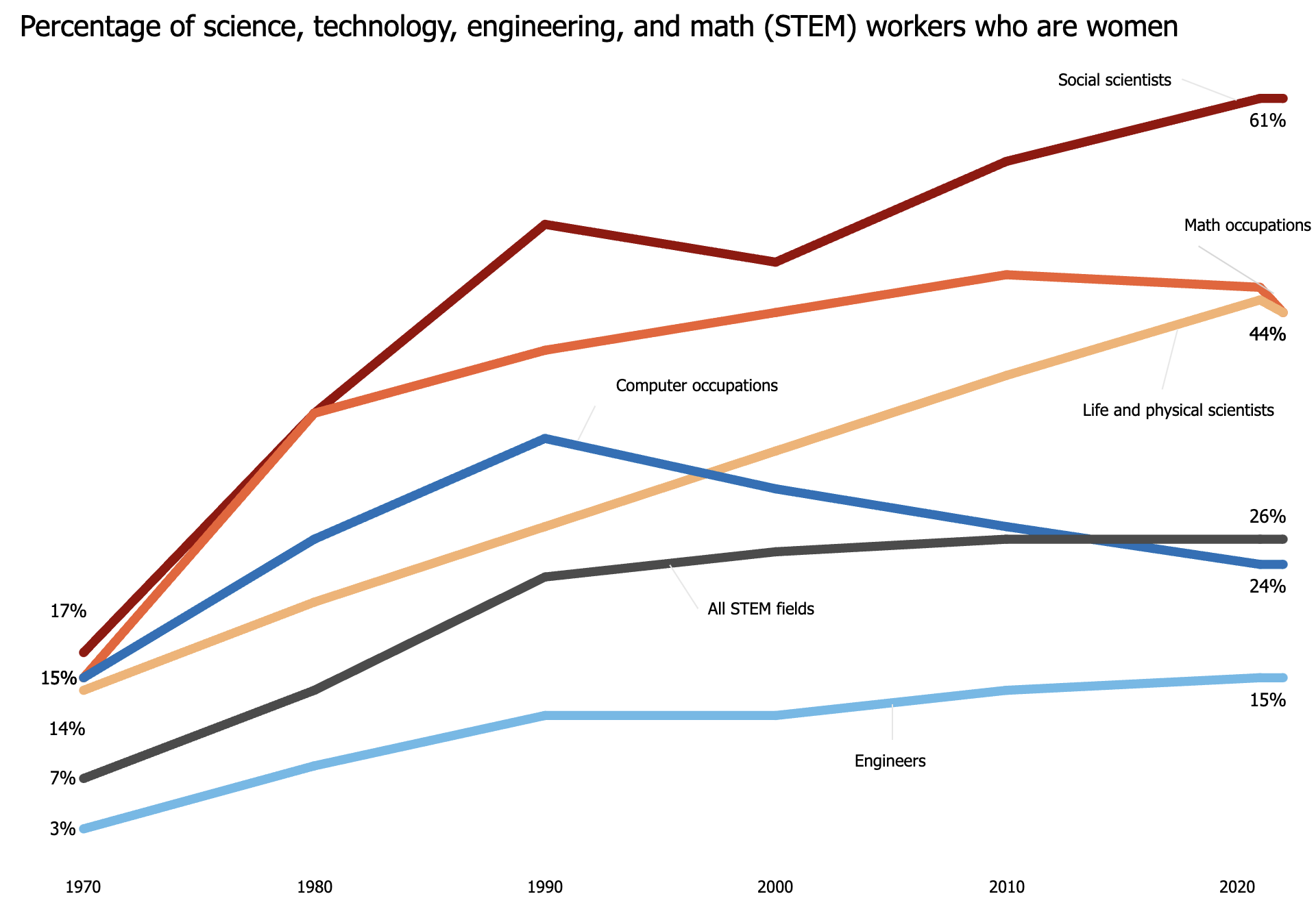What's Next for Women in Tech?
The Washington Post says “the movement to diversify Silicon Valley is crumbling”, and the story is particularly dire for gender-diversity nonprofits: Girls In Tech has dissolved, so has Women Who Code, and software companies have sharply cut their grants to others. But were they helping? The article links to this Department of Labor chart which shows women’s share of all STEM employment has grown from 25% in 2000 to only 26% in 2022. For some reason the Post didn’t cite a worse statistic on the same chart: women’s share of “computer occupations” has fallen from 30% to 24%.

I don’t know if organizations like Women Who Code fundamentally made a difference or not. I’ve partnered with a similar group called PyLadies on mentoring new conference speakers, and it seems like they make the tech scene more welcoming for women who are trying to break in. They also offer a space for experienced women to coordinate and support each other, perhaps this keeps mid-career women from leaving the industry. PyLadies is still here and stronger than ever.
Like most male programmers I was aware of the gender imbalance since I went to college, and awoke to the urgency of the problem when Tracy Chou, Jesse Jackson, and others demanded that the big software companies publish their diversity stats. Ellen Pao’s activism made an impression on me too. In 2016 some women engineers at MongoDB, where I work, called a big meeting to discuss improving diversity and inclusion there. As I recall, the meeting was stressful and exciting—it was a big-bang for diversity efforts at MongoDB.
I teamed up with a couple of colleagues in the engineering department and started shopping for diversity workshops. We tried an Ally Skills workshop (which I’d recommend to anyone) and researched some other classes, but our then-CTO Eliot Horowitz wasn’t convinced we should bring any of these trainings to the company. He demanded evidence that these things were effective. I was frustrated at the time, and grateful in retrospect. I think Eliot was right. That year I read Iris Bohnet’s book What Works: Gender Equality by Design, which was very critical of diversity trainings. They seem to be counterproductive as often as not. Bohnet reviewed the evidence and argued instead for redesigning corporate processes and structures to be more inclusive.
My activism within MongoDB declined after 2016. Executives and HR took over and there seemed to be less appetite for white male engineers like me to lead the charge. This might be for the better: the managers had the power and perhaps the expertise I lacked. A 2018 survey matches my experience. It found that individual tech employees’ participation in diversity and inclusion fell by half year-over-year. Meanwhile, MongoDB and other companies have changed for the better, but somehow those Department of Labor numbers haven’t improved.
What makes a difference for women in the software industry? My female colleagues tell me it’s most helpful to have an affinity group within the company where they can be candid with each other, and to have sympathetic managers who are open to hearing about problems with the company culture, and to have women in leadership.
And what can men do? I’m certain that individual male programmers can choose to make a difference by mentoring junior women engineers. I’ve believed this for a long time, Iris Bohnet said so in What Works, and the Harvard Business Review said so back in 2016. Mentorship boosts early-career women in tech, and it mitigates the loss of mid-career women. I asked one of my female colleagues yesterday what has been most helpful for her, and she said “individual mentorship” first, before I revealed that that’s what I think, too.
My analytics tell me that you, dear reader, are probably a male programmer. If you’re an experienced engineer, you should mentor women. If you’re worried about appearances, just don’t be creepy and you’ll be fine. Mentorship includes advice, a sympathetic ear, advocacy, and cheerleading. Here’s 10 ways to support women in tech, from the National Center for Women and Information Technology.